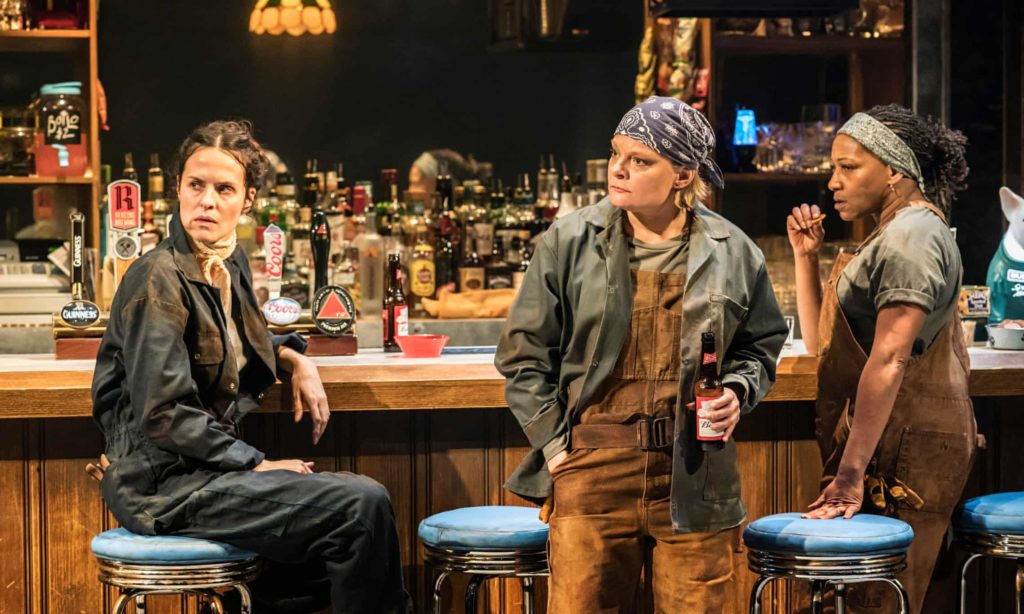
We don’t see the sweat in Sweat. It dries grimily on the skin, sinks into workclothes, or is sluiced off at home. In Lynn Nottage’s Pulitzer-winning drama, set in America’s rusting rust belt, sweat is the index of manual labour at the steelworks, effort and vigilance distilled to salty droplets. On your feet all day, straining back and bunions – yet aircon is reserved for management, who can sit at desks and do nothing more physically strenuous than yabber.
No one is management in Sweat, at least not at first. The blue-collar characters all have a longstanding, intimate connection to the assembly line, making metal tubing. Most of the action unfolds in a local bar, where the women come for birthdays and to blow off steam, where their sons have grown to join them, where even the bartender is a former factory guy, injured in a preventable accident.
People drink different stuff – one character’s gimlet seems a lime-scented trace of her long-abandoned dreams of travel – but beer is the staple. Propwatch always keeps an eye on the drinks cabinet, because liquor is character. We’ve watched the whisky in Pinter, the Jack Daniels that Rosalie Craig nurses in Company. In Lynette Linton’s production at London’s Donmar, dense with thought-out detail, you see who chooses a bottle, who chugs from draught. Who gulps fast and furious, who sips slow.
Nottage’s early scenes – set in the long aftermath of the main action – signal that bad stuff has happened. We could guess that this industrial town has taken a pummelling. It’s mostly set around 2000 – Bush’s election is on the cards – but she researched it in 2011, through repeated visits to Reading in Pennsylvania, which had lost its manufacturing base and become one of America’s poorest cities. That’s the encompassing arc in Sweat – but the enveloping emotional force of the play is its individual stories.
Here everybody knows your name – and what you’re drinking
Suspended above the stage, girders and tackle are stupefied in rust. Nothing has worked for a while. In Frankie Bradshaw’s considered design, we see the bar assemble before our eyes – stools and screens and neon signs, optics and bowls of nuts – so it shouldn’t surprise us that this solid world can fragment in a blink. Yet, in the easeful early scenes of banter and delighted story-telling, you can almost believe that it would last forever. Here, everybody knows your name and what you’re drinking. Friendships seem strong as iron, community as sturdy as assembly line overalls. But guess what? Overalls can fray. Iron can rust. The world you know can fall apart.
When Cynthia (Clare Perkins, superbly warm and worn) is promoted from the floor above her pal Tracey (a hard-bitten Martha Plimpton), their longtime friendship founders: Tracey, who is white, bitches that Cynth was only promoted because she’s African-American. At the same time, their employer embraces late-capitalist pragmatism: renegotiating contracts, busting unions, shipping in cheaper (often Latino) labour and shipping out operations. There’s a lockout, a shockingly-staged act of violence.
Some of the drinks change too: Cynthia’s double whisky is as much a sign of managerial stress and paycheck as the computer on her desk; Tracey’s double vodka is an extravagant shot of despair. The bar regulars and staff turn on each other – a companionable chug of beer after hours doesn’t cut it any more. Divisions appear along faultlines of race and class (interestingly, not so much around gender). And you realise how harmony was an illusion: economic success allowed the company to appear paternalistic, the community’s differences to blend. As the plot tightens and community unravels, things fall apart. As each day’s headlines tell us, they’re still falling.
Each time Cynthia’s son Chris (Osy Ikhile) comes into the bar, he asks what beers are on tap. Each time, in friendly exasperation, he’s told they’re the same as always. It’s a tiny moment snagging on stability and the faintest hope for change. When he returns, in 2008, the town has changed irrevocably, the bar has upscaled and for once, there’s a different answer to his question. Artisanal beer, who knew? But it’s for a new student population who have left Chris, his scattered and damaged community behind. The America we see in Sweat can’t share a beer any more.
Photo above (Leanne Best, Martha Plimpton and Clare Perkins) by Johann Persson
Follow David on Twitter: @mrdavidjays

Leave a Reply